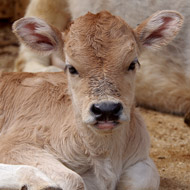Vets welcome £4m funding for NI farmers

"The removal of PIs is the key to any successful BVD eradication programme."
Northern Ireland's agriculture minister has announced £4 million funding for local livestock farmers. Veterinary organisations have welcomed the news as it includes measures to progress the country's bovine viral diarrhoea (BVD) eradication programme.
Livestock farmers, including milk producers, will be able to apply for financial aid in culling BVD persistently infected (PI) calves within four weeks of an initial BVD test, and replacement of the animal. The funds have been provided under the EU Exceptional Adjustment Aid.
Seamus O'Kane, president of the BVA's Northern Ireland branch, said he was "encouraged" by the move, which was one of the key recommendations made in the organisation's manifesto, launched ahead of May's elections.
"Persistently infected animals do not always look unwell, but they do produce vast quantities of virus throughout their lives so are a significant source of infection to other animals," he explained.
"Providing financial compensation to encourage the swift removal of these animals from a herd is a major step forward in the control of BVD."
BVA president Gudrun Ravetz added: "The removal of PIs is the key to any successful BVD eradication programme, especially when it's backed up by the effective government, veterinary profession and industry approach that we're seeing in action."
The funding is also intended to improve pig meat quality, manage soils and nutrients more effectively and assist farmers in business planning and risk management training.
Andrew Cobner, president of the British Cattle Veterinary Association (BCVA), said the support package is "great news" for Northern Ireland's cattle industry.
"BVD infection is a constant drain on the cattle industry, both through its direct effects and its indirect effects of making cattle more vulnerable to other diseases.
"Eradication of BVD is a very achievable goal and the benefits will extend into reduced antibiotic usage, helping to reduce the risk of antimicrobial resistance development."



 The latest
The latest